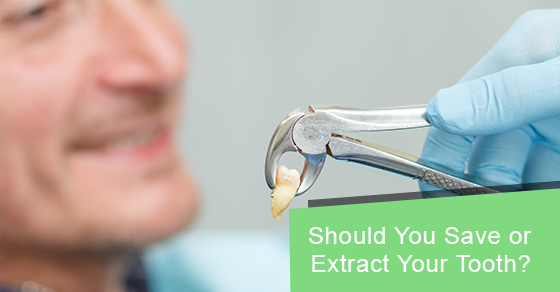Blog

Should You Save or Extract Your Tooth?
Posted by Dr. Julie Boudreault On 22-09-2021
In a perfect world your teeth would never run into any issues. They would stay strong and look attractive for decades, even as the rest of your body ages.
Unfortunately we don’t live in that world. Instead, we live in a reality where the rigours of time and normal tooth deterioration will almost certainly take their toll. Eventually, a tooth may become so damaged that you are faced with a hard decision: Should you attempt to save your tooth or have it removed?
There are valid reasons on both sides, depending on budget and desire for your oral health but to make the right choice you have to have all the information possible.
So read on, and learn all you need to know about whether you should save your tooth or not.
The Benefits of Saving Your Tooth
First, the option that most people will gravitate towards is the one that treats your tooth and saves it.
This decision makes sense as it’s backed up by quite a few reasons. For instance, the truth is that natural teeth are inherently stronger, and tend to function better than artificial ones, and are also easier to care for. Even though technology has greatly improved over the years, artificial replacement teeth are still not quite as durable as natural teeth.
Another advantage is that keeping your tooth in place means you can avoid the problem of your teeth shifting. That is to say, no gaps are created that result in neighbouring teeth moving about. Over time, this shifting can cause significant issues with chewing, bit alignment and the consequent effects of pain, poor nutrition and reduced quality of life.
Having teeth removed can also affect your youthful appearance. Keeping your teeth means you don’t have to worry about shrinking self-confidence which often happens when noticeable gaps between teeth make your smile less attractive.
The main reason to have a damaged tooth removed is to stop the pain. But after a tooth is pulled out, patients will typically report several more days of pain, especially if they experience ‘dry socket’ or any adverse side effects. However, if you have a root canal treatment rather than a tooth extraction, there is no chance of any further discomfort and you can go back to normal with the painfully eliminated.
Best of all, you get to avoid going to the dentist. An extracted tooth often means crowns, implants, bridges and other dental devices to deal with the problem of shifting teeth, meaning more dental visits, more expenses, and potentially more pain.
Perhaps surprisingly, there are also fewer costs associated with keeping and treating a damaged tooth. This is because when a tooth is removed, there has to be a replacement tooth and this can cost a lot more than not pulling it out in the first place. If you decide not to replace it - and just put up with the gap-toothed smile - you could run into a lot of the physical and emotional costs we’ve talked about above.
Why You Might Need to Remove The Tooth
Sometimes, however, it’s just not possible to get away without removing the tooth. Generally, as you can see, you should go with saving the tooth if at all possible, but sometimes an extraction is unavoidable.
Typically, if the tooth is broken, particularly on a deep level below the gum line or in a few places, an extraction will be recommended to prevent further complications. For instance, in the event that a tooth is simply too fragile or damaged, you would need it pulled.
Consider these cases:
- Teeth overcrowding
- Impacted teeth
- Irreparable tooth injury due to severe decay
- Periodontal disease
- Tooth damage related to physical trauma
These are situations where you will have to remove the tooth simply because there is no other option.
Thankfully, if a removal is necessary, the dentist will guide you through the process. Your dentist will thoroughly evaluate your medical and dental history and take x-rays to determine the length, shape and position of the tooth and bone, to find the ideal way to take it out.
Simply put, if a tooth is severely damaged for any reason, tooth extraction can be the best possible treatment.
How does a removal work?
Since tooth removal can be a bit more complicated and intimidating, it’s important to understand exactly how it works.
There are two types of methods that will likely be used. A simple extraction is one where the tooth is clearly visible and can be performed by a general dentist. The tooth and gum tissue will be anesthetized before the tooth is loosened and removed with dental forceps.
Surgical extraction, on the other hand, is a more complicated procedure used when the tooth has broken off at the gum line. You will need an oral surgeon for this, who will make small cuts into your gum before removing the underlying tooth.
The Last Word
Everyone wants their tooth to be saved but unfortunately, sometimes circumstances mean that you really don’t have the choice. You have to make the best decision you can under the circumstances. While that may mean a slightly riskier procedure, you have to recognize that these risks aren’t as bad as having an untreated tooth and that the procedure will almost certainly go well with a trained and caring dentist.
There’s clearly a lot to consider when it comes to determining whether you need to save or extract your tooth and it’s hard to decide the right course of action without some professional help.
To learn more about dental treatments, including if you need tooth extraction, call Milltown Dental at 833-318-3281 or contact us here.

